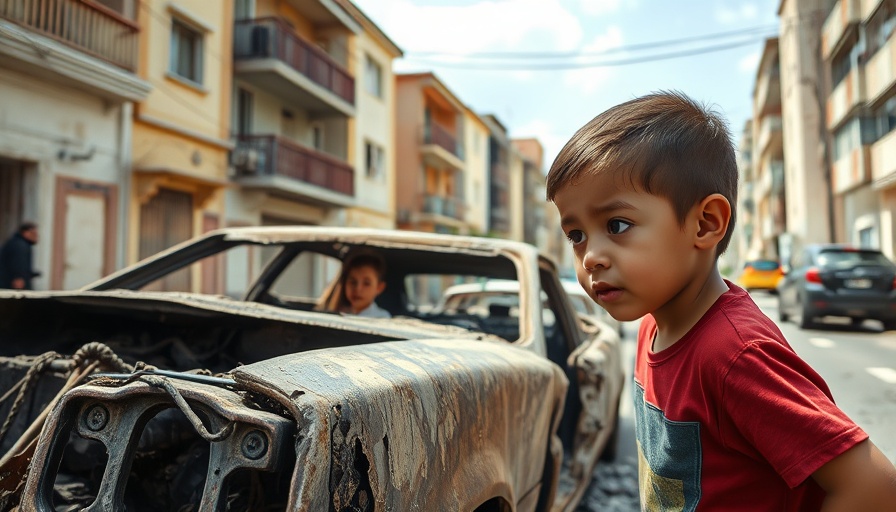
Unraveling Tensions: The Recent Clashes in the West Bank
In a profound upheaval, violence has erupted in the West Bank as hard-right Israeli settlers confronted military forces. The implications of this chaos reverberate beyond the immediate conflict, steeped in an intricate history of land disputes and political turbulence. On the night of June 30, 2025, dozens of extremists clashed with troops outside a military base, igniting a newly heightened wave of unrest.
Understanding the Context: Historical Roots of the Conflict
The ongoing strife in the West Bank cannot be detached from its historical backdrop. Since the 1967 Six-Day War, Israel has maintained control over the territories, significantly altering the demographic and socio-political landscape in favor of Israeli settlers. Today, approximately 500,000 settlers reside in the West Bank, home to around 3 million Palestinians. This disproportionate settlement dynamic has given rise to a distinct legal framework sometimes labeled as apartheid by human rights advocates, a characterization that Israel vehemently contests.
Catalysts for Unrest: A Closer Look
Recent escalations have been particularly aggravated by the military’s perceived leniency towards settler violence against Palestinians. Following an incident where an Israeli teenager was shot during clashes with soldiers, hard-right groups demonstrated fervently against what they viewed as inadequate military support. Such incidents underscore the divisions within Israeli society, with some advocating for a more aggressive approach while others push for restraint.
Diverse Perspectives: Settlers, Palestinians, and the Military
The narratives surrounding this conflict are layered and complex. Many settlers view their presence in the West Bank as both a historical reclamation and a strategic necessity. In contrast, Palestinians often feel marginalised and threatened by an expanding settlement policy that encroaches on their rights and livelihoods. The military, caught in the middle, faces backlash from both sides, illustrating the challenges of maintaining order in this flashpoint of tensions.
Rising Incidents: A Disturbing Trend
Israeli settler attacks on Palestinian communities have surged recently, with reports indicating an uptick in violence, vandalism, and intimidation tactics. Human rights organizations point to these incidents as manifestations of aggressive nationalism permeating hard-right ideologies. The settlers, while diverse in motivation—from economic reasons to ideological beliefs—often forge a united front against perceived threats from the Palestinian population.
The Role of the Military: Balancing Act or Failure?
The army has attempted to navigate this highly volatile situation, facing critiques from all sides. Some argue that the military’s responses to settler provocations are insufficient, while others say they are overly aggressive. This balancing act forces Israeli officials to tread carefully, attempting to manage a dual allegiance to national security and the political climate influenced by settler forces.
Future Predictions: What Lies Ahead?
As tensions continue to escalate, the potential for future violence remains troubling. Observers anticipate that unless a renewed diplomatic approach is taken to address the fundamental issues at stake, the cycle of violence may only deepen. Analysts call for discussions that incorporate the voices of both Palestinian and Israeli communities, highlighting that a sustainable solution will necessitate compromise, empathy, and a thorough understanding of historical grievances.
Emotional Impact: The Human Cost of Unrest
Your heart may ache when confronted with stories from those directly impacted by this violence. Families endlessly displaced, communities shattered by fear, and children growing up amidst crossfire create an emotional landscape that is hard to fathom yet essential to acknowledge. This human cost reflects the urgency for change as both Israelis and Palestinians seek a life free from fear and violence.
Conclusion: A Call for Peace and Understanding
The complexity of the situation demands a conscientious effort to bridge the divide between these communities. Recognition of the human aspect of this conflict is crucial to fostering dialogue and peace. As citizens of the world, we must advocate for understanding and empathy in pursuit of a peaceful future.
 Add Row
Add Row  Add
Add 




 Add Row
Add Row  Add
Add 

Write A Comment